 |
The Saint of the Day
St. Conrad of Parzham – April 21
Prof. Plinio Corrêa de Oliveira
Biographical selection:
Johannes Birmensdorfer, the future Conrad, was born on December 22, 1818 in Parzham a village near Passau in Bavaria, Germany, into a very pious family of peasants.
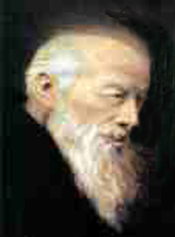
St. Conrad of Parzham |
When he was still a boy, his colleagues would change the subject of their talk if it was bad when he would approach: “Here comes Johannes, let’s not talk about this any longer.” He always kept his head uncovered in his work in the fields, even in the heat of Summer because, sensing the presence of the majesty of God everywhere, he was in continuous prayer and for that reason he thought he should not use his hat.
Johannes was the youngest son, so he was supposed to inherit the farm. This was a common custom of the area; the youngest son carried on the work of the father and received the farm. At age 30, Johanneshe left his family home and inheritance and entered the Capuchin Order as a lay brother. He was admitted with the name Conrad.
After making his vows, Brother Conrad was assigned as porter of the Capuchin Monastery of Altötting. Attached to it was a famous Marian Sanctuary that attracted thousands of pilgrims. This meant that the porter was very busy with little time to rest. He worked 18 hours each day at the door.
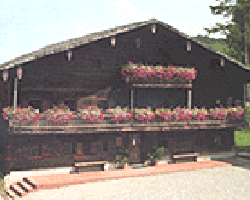
His family home in Parzham, Bavaria
Below, the Marian Sanctuary of Altötting
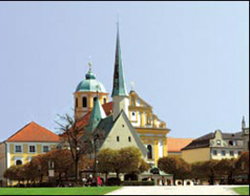 |
Brother Conrad spent 41 years at his post at the door, attending to this job with great tact and attention. Indeed, he was known for his patience and respect for others, humility, and piety; he was always willing to assist others and never lazy. No one ever saw him in a bad mood or heard him utter a useless word. He became a silent preacher, who infused respect in the visitors, converted sinners, consoled the afflicted and helped the poor.
Once he wrote to a friend:
“My life is to love God, suffer, and marvel in ecstasies and prayers about the love God has for us, poor creatures. His love never ends. There is nothing in my occupations that separates me from this union with God. My book is the Cross. It suffices for me to look at it to know what I should do.”
Three days before dying, he resigned his office of porter. He died on April 21, 1894.
Comments of Prof. Plinio:
St. Conrad of Parzham was a humble Capuchin Brother who appears as a man with very white skin, white hair and a white beard. He wears a Capuchin habit with a large key-ring at his waist, a symbol of his job as porter. I have seen some representations of him like this.
This selection offers various data to consider. First, it is interesting to see how he spread fear among his colleagues who were engaging in immoral talk. It reflects the preservation of the time and place where he lived. Today, I doubt that even a saint would spread fear among such boys at school who talk about immoral subjects. It shows how the Revolution is progressing as a cancer. Today the evil reveals itself completely and appears as triumphant. It is one of the elements that make the chastisement announced at Fatima necessary.
Second, the intensity of his piety is worthy of attention. He prayed all the time, even during his work in the fields. For this reason, he didn’t want to cover his head because no man should cover his head when he speaks with God. As a sign of respect, it should be uncovered. It also shows his lack of human respect. It is easy to imagine that many persons told him to cover himself to avoid the burning rays of the sun. But he would not heed their advice out of respect for God.
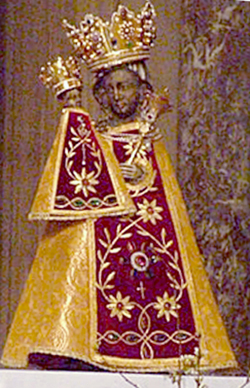
Above, the statue of of Our Lady of Altötting |
Further, it demonstrates his admirable mortification. Manual labor is already hard in itself, but if one carries it out with the sun beating on his head, it becomes twice as difficult. Well, Conrad not only did this but he was also able to still focus on his meditations, which reveals an enormous capacity of concentration, especially if compared with the modern man, so dispersive in his thinking.
Third, at age 30 he entered the Capuchin Order and was assigned the role of porter in the Monastery near a famous Sanctuary of Our Lady. He became the opposite of the porter common to many monasteries. I have known many porters of monasteries and in general, they are aggressive, lazy and prone to bad moods. When one rings the bell of a monastery or calls on the phone asking to speak with a monk, it can take a very long time for the porter to call the monk, and then another long wait for the monk to arrive (1). The porters are often negligent and indifferent to the needs of the visitor. St. Conrad was the very opposite: he was respectful, solicitous, and efficient.
Fourth, he was a man who edified everyone who came into contact with him. By his presence and virtue, he preached an unspoken lesson for 41 years. He became a great missionary, a true preacher, even though he had never given a sermon. This shows us that men who can carry out a good apostolate are not only those who have the capacity to speak or teach. A simple man like St. Conrad was quite efficient, but in this case the key to his apostolate was not based upon his natural talent but rather his supernatural life. The supernatural life that dwells in the interior man irradiates to those around them. For this reason we see a simple lay brother porter holding a very obscure job and without notable learning who did an enormous good for the Catholic cause.
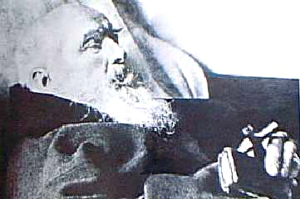
St. Conrad on his death bed |
The life of St. Conrad of Parzham is a splendid illustration of the principle enunciated by Dom Chautard that the soul of all apostolates is the interior life. If we want our apostolate to be fecund, we should do it exclusively for the love of God. Not to be important, not to appear before others, but only for the cause of Our Lady. If we do this, our apostolate will be a channel of grace.
If we have self-interest, it will be a blocked channel that does not let the waters flow through. Souls will be thirsty for graces and because of our guilt, they will not receive the waters that Our Lady wants to give them. A serious apostolate demands a complete abnegation and a complete renouncement of our self love.
Give me an entirely abnegated man and I will give you an apostle.
Let us ask St. Conrad of Parzham to help us have the abnegation of which he was a model, indispensable for the accomplishment of our vocation.
Note 1: For many years until the 1950s, Prof. Plinio was the lawyer for both the Carmelite Order and the Archdiocese of Sao Paulo. This job required him to be in constant contact with monasteries.


  | | Prof. Plinio Corrêa de Oliveira | |
The Saint of the Day features highlights from the lives of saints based on comments made by the late Prof. Plinio Corrêa de Oliveira. Following the example of St. John Bosco who used to make similar talks for the boys of his College, each evening it was Prof. Plinio’s custom to make a short commentary on the lives of the next day’s saint in a meeting for youth in order to encourage them in the practice of virtue and love for the Catholic Church. TIA thought that its readers could profit from these valuable commentaries.
The texts of both the biographical data and the comments come from personal notes taken by Atila S. Guimarães from 1964 to 1995. Given the fact that the source is a personal notebook, it is possible that at times the biographic notes transcribed here will not rigorously follow the original text read by Prof. Plinio. The commentaries have also been adapted and translated for TIA’s site.
|
Saint of the Day | Home | Books | CDs | Search | Contact Us | Donate

© 2002- Tradition in Action, Inc. All Rights Reserved
|
 |

|